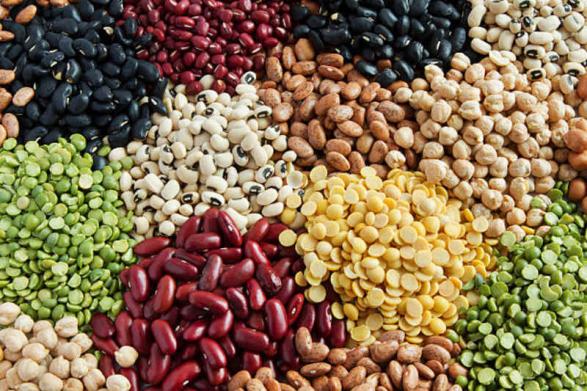Reaping the Rewards: Top 10 Health Benefits of Legumes
Nov 08, 2023 By Madison Evans
Are you looking to take your eating and overall health up a notch? Legumes are the perfect answer! Not only do they offer a wide variety of flavors, textures, and colors; they're also one of the most nutritious plant-based foods available. With an impressive range of vitamins and minerals packed into small packages, there's no denying that legumes provide multiple benefits to our health when consumed in moderation. Studies show that regularly including legumes in your diet can reduce inflammation in the body, support heart health, promote digestive regularity as well as manage blood sugar levels. Read on for our top 10 list of all the amazing ways incorporating legumes into your daily meal plan can lead to lasting wellness rewards for you now and down the line!
Overview of legumes

Legumes are a type of plant that produce seeds or pods and belong to the family Fabaceae. This family includes popular foods such as beans, lentils, peas, chickpeas, and peanuts. Legumes can be consumed in many different forms, including cooked, canned, dried, and even ground into flours. They are a staple in many traditional cuisines around the world and have been cultivated for thousands of years. Not only are they a cost-effective source of plant-based protein, but they also provide complex carbohydrates, fiber, and essential micronutrients.
Importance of legumes in a diverse diet
Including a variety of foods in our diet is crucial to obtain all the necessary nutrients that our bodies need for optimal functioning. Legumes are an essential part of a diverse and balanced diet, especially for those following vegetarian or vegan lifestyles. They provide important vitamins and minerals such as iron, magnesium, potassium, and folate. These micronutrients play vital roles in maintaining energy levels, supporting organ function, and promoting overall health. Additionally, legumes are naturally cholesterol-free and low in fat, making them a heart-healthy choice.
The Top 10 Health Benefits of Legumes
1. High in Plant-based Protein
Legumes are a great source of plant-based protein, making them an excellent alternative for those looking to reduce their intake of animal products. They contain approximately 20-25% protein by weight, which is higher than most other plant-based foods. Adding legumes to your meals can help you meet your recommended daily protein intake and keep you feeling full for longer.
2. Rich in Fiber
One of the most well-known benefits of legumes is their high fiber content. Fiber plays an important role in regulating digestion, promoting satiety, and maintaining a healthy gut microbiome. Legumes are an excellent source of both soluble and insoluble fiber, making them beneficial for digestive regularity and preventing constipation.
3. Lowers Cholesterol Levels
The fiber in legumes can also help lower cholesterol levels by binding to substances in the digestive tract that contribute to high cholesterol. This is especially beneficial for individuals with high cholesterol or those at risk for heart disease.
4. Promotes Heart Health
Along with lowering cholesterol, legumes have been found to improve overall heart health. Studies have shown that incorporating legumes into your diet can reduce the risk of coronary heart disease and stroke due to their high levels of fiber, folate, and potassium.
5. Regulates Blood Sugar Levels
Legumes have low glycemic index, meaning they are digested slowly and do not cause spikes in blood sugar levels. This makes them a great addition to meals for individuals with diabetes or those looking to manage their blood sugar levels.
6. Reduces Inflammation
Chronic inflammation in the body has been linked to various health issues, such as heart disease, cancer, and autoimmune diseases. The antioxidants and anti-inflammatory compounds found in legumes can help reduce inflammation and promote overall health.
7. Supports Weight Management
Due to their high protein and fiber content, legumes can help with weight management by keeping you feeling full for longer. They also have a lower calorie density compared to many other foods, making them a great option for those looking to maintain or lose weight.
8. Provides Essential Micronutrients
Legumes are packed with essential micronutrients such as iron, magnesium, potassium, and folate. These nutrients are important for maintaining energy levels, supporting organ function, and promoting overall health.
9. Versatile in Cooking

Legumes can be cooked and consumed in many different ways, making them a versatile ingredient in the kitchen. They can be used in soups, stews, salads, dips, and even baked goods. This allows for endless possibilities in incorporating them into your meals.
10. Cost-effective
Compared to other sources of protein, legumes are relatively inexpensive and can be bought in bulk. This makes them a cost-effective option for those on a budget looking to maintain a healthy diet.
How to incorporate legumes into your diet
With all the amazing health benefits that legumes provide, it's no surprise that they should be a regular part of your diet. Here are some easy ways to incorporate them into your meals:
- Add cooked lentils or chickpeas to salads for an extra boost of protein and fiber.
- Use beans instead of meat in dishes such as chili, tacos, and burgers.
- Substitute all-purpose flour with chickpea or lentil flour in baking recipes.
- Make a dip using mashed beans, herbs, and spices for a healthy snack option.
- Use hummus as a spread on sandwiches instead of mayonnaise.
- Add cooked legumes to soups and stews for extra texture and nutrients.
Conclusion
Incorporating legumes into your diet can have numerous health benefits and contribute to a diverse and balanced meal plan. They are nutrient-dense, versatile, and cost-effective, making them an excellent addition to any lifestyle. So next time you're meal planning, don't forget to include some delicious legume-based dishes! So why not try adding legumes to your next meal and reap the many health benefits they have to offer. Let's embrace the power of legumes in our diets and enjoy not only their delicious flavors but also their nourishing properties for our bodies.
-
 Condition Oct 06, 2023
Condition Oct 06, 2023Recognizing the Warning Signs: Mild to Mini Stroke Symptoms
Learn critical stroke symptoms, from mild to mini, and understand their significance. Act fast to save a life.
-
 Food Nov 08, 2023
Food Nov 08, 2023Reap the Rewards: Top Health Benefits of Eating Papaya
Explore the numerous health benefits of papaya, understand its nutritional value, and discover creative ways to incorporate this delicious, nutritious fruit into your diet.
-
 Food Nov 08, 2023
Food Nov 08, 2023Improve Your Mood: Foods that Increase Serotonin Levels
Explore how certain foods can increase your serotonin levels, providing essential support for mood regulation and overall mental well-being.
-
 Food Nov 08, 2023
Food Nov 08, 2023Unveiling the Health Secrets: The 8 Key Wellness Benefits of Mint
Discover the myriad of health benefits mint offers, from aiding digestion to boosting energy. Learn how to incorporate this nutrient-rich herb into your daily routine.
